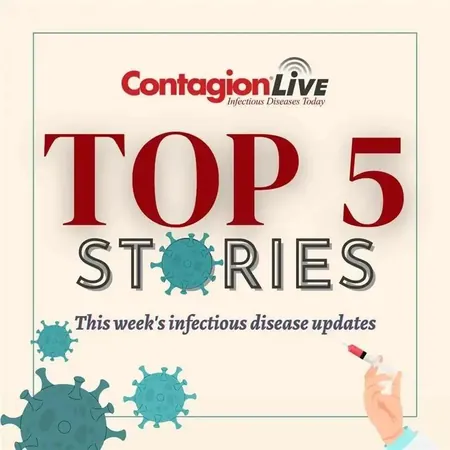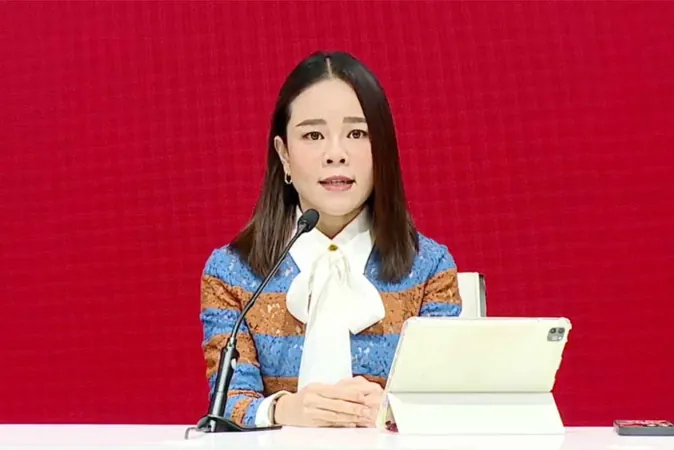
5 Must-Know Infectious Disease Updates: Sept 6-13
2025-09-13
Author: Arjun
The Hidden Costs of Noncommunicable Diseases
At a recent ASM Microbe conference, Dr. Jacinda C. Abdul-Mutakabbir from UC San Diego shed light on the critical impact of social determinants of health. Factors like poverty, transportation issues, and lack of health literacy are creating barriers to care, leading to delays in diagnosis and higher risks for noncommunicable diseases (NCDs) and infections. She emphasizes a staggering connection between NCDs and multidrug-resistant infections, especially in low-income areas and parts of the U.S. Abdul-Mutakabbir urges a shift in focus from treatment to prevention, calling for a unified approach that integrates lab findings with real-world patient data.
Measles Cases in the U.S.: A Promising Decline
As of September 9, 2025, the CDC has documented 1,454 measles cases across 42 jurisdictions, with just three new cases reported last week—the lowest increase since January. Alarmingly, 86% of these cases are tied to outbreaks, and approximately 92% of patients were unvaccinated or had unknown vaccination status. The drop in the kindergarten MMR vaccination rate from 95.2% to 92.7% since 2019 puts around 280,000 kids at risk, highlighting an urgent need for clinicians to prioritize catch-up vaccinations and ensure immunity verification before international travel.
Groundbreaking Discovery: 750-Day SARS-CoV-2 Infection
In an unprecedented finding reported by The Lancet Microbe, researchers have confirmed one of the longest SARS-CoV-2 infections—extending over 750 days—in a patient with advanced HIV-1. The study, tracking specimens from March 2021 to July 2022, revealed a mutation pattern that could hint at the evolution of variants akin to Omicron. While the risk of transmission appears low, this case underscores the need for vigilant surveillance and timely antiviral treatments in immunocompromised patients.
Implementation Science: A New Path to Improved Healthcare Access
At the University of North Carolina, Dr. Michael Herce introduced the concept of implementation science to address healthcare inequalities. He stressed the importance of collaborating with local communities to tailor health interventions to their unique needs. By emphasizing shared goals and effective communication, this approach follows lessons learned during the COVID-19 pandemic, showing that collaboration can significantly enhance healthcare outcomes in underserved regions.
Revolutionizing Vaccines: The Path to Universal Influenza Formulations
Corner Therapeutics has announced groundbreaking preclinical data that could revolutionize influenza vaccination. Its innovative lipid-based “hyperactivator” adjuvant shows promise in converting the seasonal flu vaccine into a universal formulation in animal studies, outperforming traditional adjuvants. This technology not only maintained favorable safety profiles but could also be adapted for oncology treatments that require strong T cell responses. Clinical trials are anticipated to begin by 2027.




 Brasil (PT)
Brasil (PT)
 Canada (EN)
Canada (EN)
 Chile (ES)
Chile (ES)
 Česko (CS)
Česko (CS)
 대한민국 (KO)
대한민국 (KO)
 España (ES)
España (ES)
 France (FR)
France (FR)
 Hong Kong (EN)
Hong Kong (EN)
 Italia (IT)
Italia (IT)
 日本 (JA)
日本 (JA)
 Magyarország (HU)
Magyarország (HU)
 Norge (NO)
Norge (NO)
 Polska (PL)
Polska (PL)
 Schweiz (DE)
Schweiz (DE)
 Singapore (EN)
Singapore (EN)
 Sverige (SV)
Sverige (SV)
 Suomi (FI)
Suomi (FI)
 Türkiye (TR)
Türkiye (TR)
 الإمارات العربية المتحدة (AR)
الإمارات العربية المتحدة (AR)